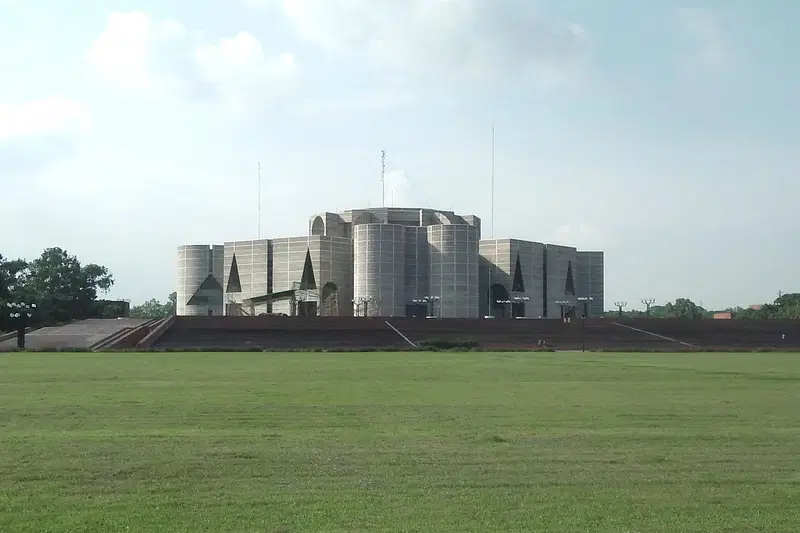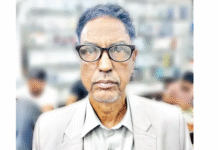
In 1986, the weekly Jai Jai Din, edited by Shafiq Rehman, published a cover story titled “The Parliament’s Adornment: Thirty Sets of Ornaments.” The report created quite a stir among readers. It discussed the nomination of women for the 30 reserved seats in the National Parliament. The article not only contained factual information but was satirical.
In the 1986 election, General Hussain Muhammad Ershad’s Jatiya Party won a majority in parliament. At that time, 30 seats in parliament were reserved for women. Many women eagerly sought nominations from the Jatiya Party, with some of the lucky ones receiving the nomination, while others, disappointed by the party’s indifference, expressed their frustration. Some even claimed that they had invested a lot of effort, money, and even youth in their bids to gain the party’s nomination. What would become of them now?
We know that the 300 members elected through direct voting in parliament are the ones who nominate women for the reserved seats. According to our Constitution, this is the prescribed method. These members act under the instructions of their party leaders, and personal connections with the party leader and their associates often play a role in the nominations. In most cases, these nominees are close relatives or friends of the leaders. After reading the report, Jatiya Party Chairman and President Hussain Muhammad Ershad was furious. Party thugs attacked Jai Jai Din’s office and wreaked havoc. The newspaper was then banned.
After the 2001 elections, the number of “ornaments” in parliament increased from 30 to 45. Following the 2008 elections, the number was raised to 50. Efforts and initiatives for women’s empowerment in Bangladesh have often been commendable. However, I fail to understand how empowering women through these reserved seats truly empowers them. Our Constitution has a written commitment in Article 28, promising that the state will not engage in discriminatory practices between men and women. It affirms equal rights for men and women in all areas of state and public life.
Both men and women can contest elections for all seats in parliament. So, why a separate “quota” for women? The state has committed to offering special benefits to marginalised sections of society to help them integrate into the mainstream. This means that “women” are recognised as a backward group. Society is patriarchal. Normally, women face many obstacles in competing against men in elections. To help them rise alongside men, the state must create a supportive environment.
In the first general elections of undivided Pakistan in 1970, 13 seats in the National Assembly and 15 seats in the Provincial Assembly were reserved for women. In the 1972 Constitution, 15 seats for women were reserved for the next ten years. At that time, this arrangement was considered acceptable. Over time, the number of reserved seats and their duration have been extended.
The question of why a separate quota for women keeps resurfacing. The problem is that political parties in this country are male-dominated. Even when the party leader is a woman, it is often because of family connections, rather than her personal merit. The environment and culture within these parties make it difficult for women to feel comfortable. We see women taking on leading roles in many professions, such as skilled teachers, physicians, scientists, businesspeople, civil servants, pilots, writers, journalists, and more. Yet, in politics, they remain largely absent or lagging behind. They are more inclined to get involved with social-cultural organisations or NGOs than with political parties.
Women make up half of the country’s population. It is disgraceful for national institutions to be dominated by men, with no participation of women in decision-making processes. This is not in line with modern society. That is why constitutional experts thought that, even if temporarily, extra opportunities should be provided to make women more visible in the highest legislative forums. If they can be elected in general elections, that would be ideal.
However, that rarely happens. Only a few women have managed to compete against men in general elections and win. Despite the extension of the reserved seats, the situation hasn’t changed. It remains difficult for women to get party nominations. Therefore, political parties introduced the “quota” system. Many women have been elected to parliament through this system, which is called “positive discrimination.” It is meant to create a favourable environment for the development of female leadership for the greater welfare of society.
This is a temporary arrangement, but the original purpose is being undermined. Most women elected through the quota system do not represent the interests of women. They are able to enter Parliament thanks to the goodwill of male members and the favour of party leaders. There is no pride in this. In local government, there are reserved seats for women in union councils, municipality and city corporations, where they have been directly elected for nearly 25 years. But this has not been implemented in the National Parliament. The reason is that those directly elected through votes do not genuinely want to empower women. They want to bring in women of their own choosing, regardless of merit.
Some women in this system are more interested in becoming members of the Parliament Club than in engaging in electoral competition. For them, it’s a good job — wealth, power, prestige, land, apartments, and more. This is a sad example of how low a woman’s self-respect can fall when she seeks to reach the centre of power on others’ mercy.
I see no objection to the reserved seats for women in parliament, but why should they not be directly elected by the voters of specific constituencies? On election day, voters could use two ballots — one for the general seats and another for the reserved seats. In this way, women elected to the reserved seats could proudly say that they were elected representatives too. Otherwise, they will remain just 50 sets of ornaments. The question is, why should the public pay them salaries and allowances just to adorn the parliament?
No political party that has been in power has introduced a bill for direct elections for reserved women’s seats. Citizen organisations have held many seminars and raised this demand, but the major ruling or opposition parties have ignored it.
The election commission of the ‘1/11′ government had made a rule that within ten years, at least one-third of the members in all levels of political party committees should be women. To date, no party has implemented this. Due to the political parties’ non-cooperation, this provision has probably been repealed.
Recently, there has been much talk about state reform. Awami League is not active in the field, and the BNP has presented a 31-point reform proposal. However, none of these include direct elections for reserved women’s seats. So, what kind of reform is this? Do they want to keep the women’s quota just to balance power in parliament?
prothom alo









